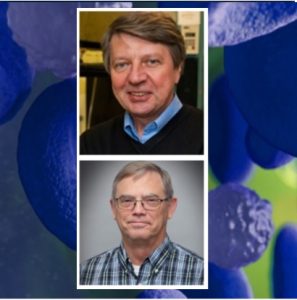 Carnegie Mellon University (CMU) has licensed a proprietary platform for bioengineering exosomes for drug delivery to Coya Therapeutics, Inc. Through the agreement, Coya has optioned the exclusive worldwide rights to research, develop, manufacture, and commercialize exosome polymer hybrids using the platform developed by an interdisciplinary team of CMU chemists and engineers. The team includes McGowan Institute for Regenerative Medicine affiliated faculty members Krzysztof Matyjaszewski, PhD (pictured top), professor of natural sciences, and Phil Campbell, PhD (pictured bottom), research professor of biomedical engineering.
Carnegie Mellon University (CMU) has licensed a proprietary platform for bioengineering exosomes for drug delivery to Coya Therapeutics, Inc. Through the agreement, Coya has optioned the exclusive worldwide rights to research, develop, manufacture, and commercialize exosome polymer hybrids using the platform developed by an interdisciplinary team of CMU chemists and engineers. The team includes McGowan Institute for Regenerative Medicine affiliated faculty members Krzysztof Matyjaszewski, PhD (pictured top), professor of natural sciences, and Phil Campbell, PhD (pictured bottom), research professor of biomedical engineering.
Exosomes are a nanometer-sized type of extracellular vesicle that can be shed from every cell in the body and can hold a variety of cargo, including proteins, lipids, metabolites, and nucleic acids. Researchers worldwide have been attempting to harness the exosome as a drug delivery vehicle, but many of the techniques that have previously been developed required the use of complex molecular biology tools or degraded the exosome’s innate functionality.
Sushil Lathwal, PhD, then a doctoral candidate in the Mellon College of Science’s Department of Chemistry, and Saigopalakrishna (Sai) Yerneni, PhD, then a doctoral candidate in the College of Engineering’s Department of Biomedical Engineering, came up with an idea to surmount these obstacles. They worked alongside researchers in the laboratories of Subha Das, PhD, associate professor of chemistry, Dr. Matyjaszewski, and Dr. Campbell, to create a method that engineers exosomes with a DNA-cholesterol tether. The synthetic single-stranded DNA on the tether can bind with a complementary strand of DNA linked to a bioactive agent.
“Our research on exosome surface modification started, in the best traditions of Carnegie Mellon University, as an interdisciplinary collaborative project. Although this project began out of simple curiosity of combining our respective research interests, we are delighted to see its potential clinical translation with our venture with Coya Therapeutics,” Drs. Das and Campbell said in a statement.
Coya Therapeutics is a clinical-stage biotechnology company that develops approaches that enhance regulatory T cell (Tregs) in vivo, including autologous and allogenic Treg-derived exosome therapeutic and novel biologics. They plan to develop exosome-polymer hybrids (EPHs) to enable exosomes to be homed to proteins of interest, while delivering select payloads to targeted cells.
Read more…
